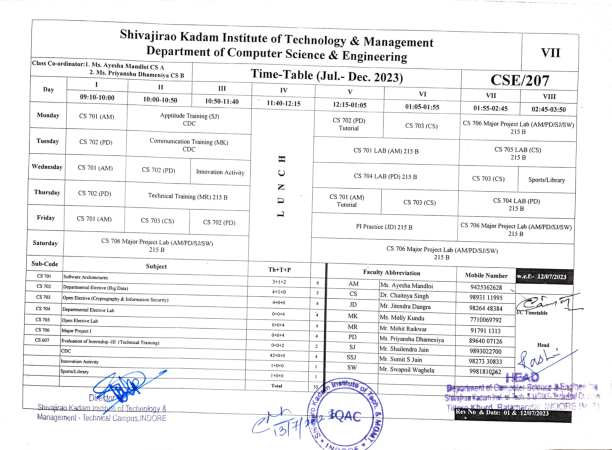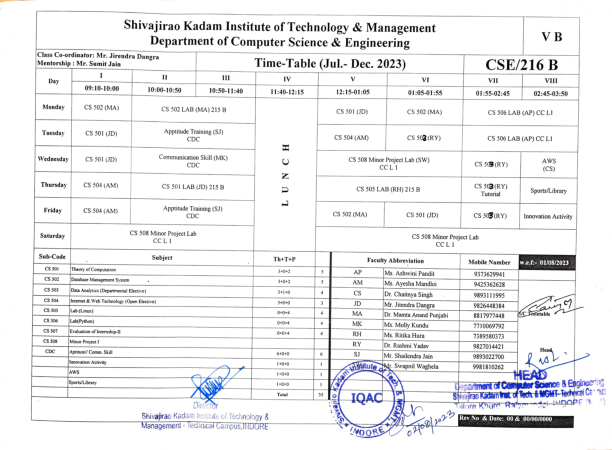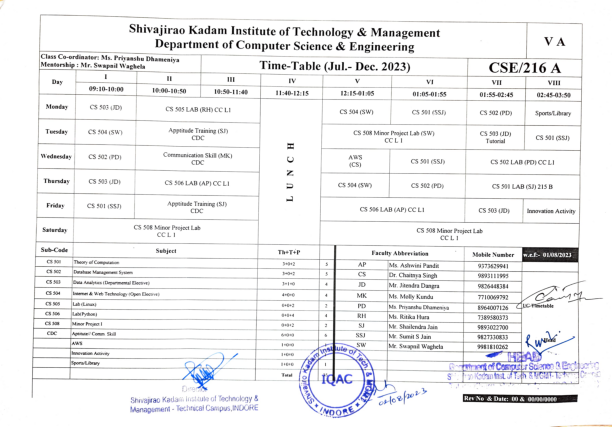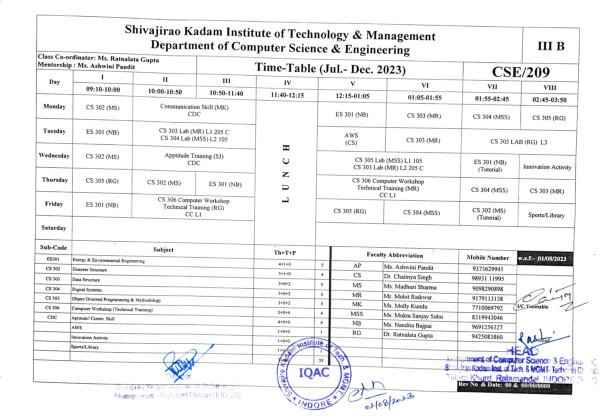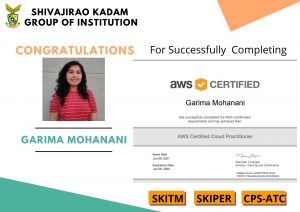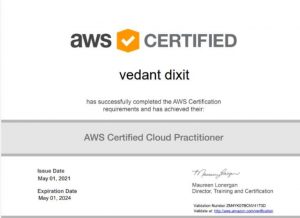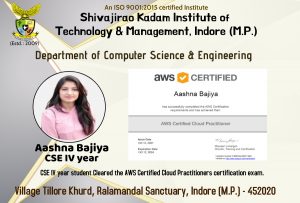Computer Science & Engineering
Dr. Rashmi Yadav
Head of Department
Department of Computer Science & Engineering
It is a pleasure to head the department of CSE. The department offers B-Tech (CSE).There are several ways to present the canonical core of computer science and Engineering.
Technology changes rapidly, especially in the field of computing. Over the years we have developed a distinct style and method that bridges the theory – practice divide while remaining grounded in the core.
Our Department has produced hundreds of professionals and has established a name for itself in the state, country and abroad. They have consistently excelled in the highly competitive industrial environment. I attribute this success to the winning combination of a dedicated faculty that works hard at imparting quality education, a well-planned syllabus and last but not least, our students.
As a student at SKITM, you have the opportunity to study a variety of subjects encompassing all aspects of Computer Science and Engineering.
Intake, Affiliation and Duration
- Program: B.Tech. (Computer Science & Engineering)
- Intake: 180
- Duration: 04 Years
- Approved By: AICTE
- Affiliation: Rajiv Gandhi Proudyogiki Vishwavidyalaya, Bhopal
Vision
Empower graduates to innovate and be employable in the area of Computer Science and Engineering by imparting quality education with sustainability and inculcating human values.
Mission
Provide high impact teaching and learning that enriches students for technical knowledge to achieve success in professional careers and entrepreneurship. Our department emphasizes to adopt continues changes in life through research skills, innovative ideas and high studies that contribute to the society ethically.
| SN | Name | Designation | Qualifications | Email Id |
| 1 | Dr. Rashmi Yadav | Professor & Head | B.E., M.Tech, Ph.D | [email protected] |
| 2 | Dr. Preetesh Purohit | Professor & Dean Engineering | B.E., M.Tech, Ph.D | [email protected] |
| 3 | Dr. Dharmendra Chouksey | Professor | B.E., M.Tech, Ph.D | [email protected] |
| 4 | Prof. Sumit Jain | Assistant Professor | B.E., M.Tech, Ph.D (Pur) | [email protected] |
| 5 | Dr. Ratanlata Gupta | Assistant Professor | B.E., M.E., Ph.D | [email protected] |
| 6 | Dr. Mamta Anand | Assistant Professor | B.E., M.Tech, Ph.D, GATE | [email protected] |
| 7 | Prof. Jayesh Umre | Assistant Professor | B.E., M.Tech, GATE, NET | [email protected] |
| 8 | Prof. Swapnil Waghela | Assistant Professor | B.E., M.E. | [email protected] |
| 9 | Prof. Ayesha Mandloi | Assistant Professor | B.E., M.E. | [email protected] |
| 10 | Prof. Ashwini Khadke | Assistant Professor | B.E., M.E. | [email protected] |
| 11 | Prof. Mohit Raikwar | Assistant Professor | B.E., M.E. | [email protected] |
| 12 | Prof. Priyanshu Dhameniya | Assistant Professor | B.E., M.E. | [email protected] |
| 13 | Prof. Pratibha Pal | Assistant Professor | B.E., M.E. | [email protected] |
| 14 | Prof. Jitendra Dangra | Associate Professor | B.E., M.E. | [email protected] |
| 15 | Prof. Ritika Hura | Assistant Professor | B.E., M.E. | [email protected] |
| 16 | Prof. Nilesh Joshi | Assistant Professor | B.E., M.E. | [email protected] |
| 17 | Prof. Khushboo Nagar | Assistant Professor | B.E., M.E. | [email protected] |
| 18 | Mr. Sunil Bhardwaj | Network Admin | Diploma | [email protected] |
| 19 | Mrs. Sujata Yadav | Network Admin | RedHat, MBA in Computer Management | [email protected] |
| 20 | Mr. Sunil Singh Panwar | Lab Technician | Diploma | [email protected] |
| 21 | Mr. Roshan Purkar | Lab Technician | B.Com, Network Diploma | [email protected] |
| 22 | Mr. Sanjay Sonwane | Lab Technician | Diploma | [email protected] |
| 23 | Mr. Yogesh Sonar | Lab Technician | Diploma | [email protected] |
| 24 | Mr. Kunal Survey | Lab Technician | Diploma | [email protected] |
| 25 | Ms. Nikita Sakle | Office Assistant | B.Sc | [email protected] |
- Engineering knowledge: Apply the knowledge of mathematics, science, engineering fundamentals, and an engineering specialization to the solution of complex engineering problems.
- Problem analysis: Identify, formulate, review research literature, and analyze complex engineering problems reaching substantiated conclusions using first principles of mathematics, natural sciences, and engineering sciences.
- Design/development of solutions: Design solutions for complex engineering problems and design system components or processes that meet the specified needs with appropriate consideration for the public health and safety, and the cultural, societal, and environmental considerations.
- Conduct investigations of complex problems: Use research-based knowledge and research methods including design of experiments, analysis and interpretation of data, and synthesis of the information to provide valid conclusions.
- Modern tool usage: Create, select, and apply appropriate techniques, resources, and modern engineering and IT tools including prediction and modeling to complex engineering activities with an understanding of the limitations.
- The engineer and society: Apply reasoning informed by the contextual knowledge to assess societal, health, safety, legal and cultural issues and the consequent responsibilities relevant to the professional engineering practice.
- Environment and sustainability: Understand the impact of the professional engineering solutions in societal and environmental contexts, and demonstrate the knowledge of, and need for sustainable development.
- Ethics: Apply ethical principles and commit to professional ethics and responsibilities and norms of the engineering practice.
- Individual and team work: Function effectively as an individual, and as a member or leader in diverse teams, and in multidisciplinary settings.
- Communication: Communicate effectively on complex engineering activities with the engineering community and with society at large, such as, being able to comprehend and write effective reports and design documentation, make effective presentations, and give and receive clear instructions.
- Project management and finance: Demonstrate knowledge and understanding of the engineering and management principles and apply these to one’s own work, as a member and leader in a team, to manage projects and in multidisciplinary environments.
- Life-long learning: Recognize the need for, and have the preparation and ability to engage in independent and life-long learning in the broadest context of technological change.
- Graduates will be engineering practitioners and leaders who will help solve the industry’s technological problems.
- Graduates will be engineering professionals, innovators, or entrepreneurs engaged in technology development or engineering system implementation in industry.
- Graduates will function in their profession with social awareness and responsibility.
- Graduates will interact with their peers in other disciplines in industry and society and contribute to the economic growth of the country.
- Graduates will be successful in pursuing higher studies in engineering or management.
- Graduates will pursue career paths in teaching or research.
| Name of program | Year/Semester | Course Code | Course Name | Scheme | Syllabus |
| B.Tech. CSE | II/III | ES301 | Energy & Environmental Engineering | View | View |
| CSIT302 | Discrete Structure | ||||
| CSIT303 | Data Structure | ||||
| CSIT304 | Digital Circuits & System | ||||
| CSIT305 | Object Oriented Programming &Methodology | ||||
| CSIT306 | Java Programming | ||||
| BT107 | Evaluation of Internship-I completed in 1st year | ||||
| BT307 | 90 hrs internship based on using various softwares-Internship-II | ||||
| BT308 | Indian Constitution | ||||
| B.Tech. CSE | II/IV | BT401 | MIII | View | View |
| CS402 | Analysis Design of Algorithm | ||||
| CS403 | Software Engineering | ||||
| CS404 | Computer Org. & Architecture | ||||
| CS405 | Operating Systems | ||||
| CS406 | Programming Practices | ||||
| BT407 | 90 hrs internship based on using various softwares-Internship-II | ||||
| BT408 | Cyber Security | ||||
| BT409 | Indian Knowledge System | ||||
| B.Tech. CSE | III/V | CS501 | Theory of Computation | View | View |
| CS502 | Database Management Systems | ||||
| CS503 | Dept. Elective | ||||
| CS504 | Open Elective | ||||
| CS505 | Lab (Linux) | ||||
| CS506 | Lab (Python) | ||||
| CS507 | Evaluation of Internship-II | ||||
| CS508 | Minor Project- I | ||||
| B.Tech. CSE | III/VI | CS601 | Machine Learning | View | View |
| CS602 | Computer Networks | ||||
| CS603 | Dept. Elective | ||||
| CS604 | Open Elective | ||||
| CS605 | Data Analytics Lab | ||||
| CS606 | Skill Development Lab | ||||
| CS607 | Internship-III | ||||
| CS608 | Minor Project- II | ||||
| B.Tech. CSE | IV/VII | CS701 | Software Architectures | View | View |
| CS702 | Departmental Elective | ||||
| CS703 | Open Elective | ||||
| CS704 | Departmental Elective Lab | ||||
| CS705 | I.O.T. Lab | ||||
| CS706 | Major Project-I | ||||
| CS607 | Evaluation of Internship -III | ||||
| B.Tech. CSE | IV/VIII | CS801 | Internet of Things | View | View |
| CS802 | Blockchain Technology | ||||
| CS803 | Open Elective | ||||
| CS804 | D/O elective lab | ||||
| CS705 | Major Project-II |
Amazon web services (AWS, Academy) four courses
- Foundation, AWS Academy Cloud(Offering)
- Architecting, AWS Academy Cloud
- Developing, AWS Academy Cloud
- Operations, AWS Academy Cloud
Oracle Academy Member Program
- Java Fundamentals
- Java Foundations
- Java Programming
- Artificial Intelligence with Machine Learning in Java
- Database Foundations
- Database Design and Programming with SQL
- Programming with PL/SQL
- APEX- Application Development Foundations
NPTEL- Spoken Tutorial (IIT-Bombay)
- Courses like Python Programming, Scilab, C & C++, etc
UiPath RPA Academy
- UiPath Certified RPA Associate (UiRPA)
- UiPath Certified Advanced RPA Developer (UiARD)
Additional training
- Short Term Training Program on Data Science and Big Data Analytics.
- Training program on Internet of Things (IoT) in which the students are introduced to Mobile connectivity practically, through NodeMCU and Arduino.
- Short term training session on Cloud Computing with AWS.
- A three-week training program on MATLAB Applications.
- A training on Industrial Automation using PLC and SCADA.
- Training on “Information security services” in association with CDAC, Hyderabad.
- Training on SAP usage and application provided by industry’s leading experts.
| Lab No.: 205A | |||
| Sr. No. | Equipment Details | Quantity | Configuration |
| 01 | PC (Dell 390) | 30 | Processor: Intel i3
Ram: 4GB HDD: 500GB Monitor: 19” (LED) |
| Name of Lab | OS/OOT Lab. | ||
| Lab No.: 205B | |||
| Sr. No. | Equipment Details | Quantity | Configuration |
| 01 | PC (Dell 390) | 30 | Processor: Intel i3
Ram: 4GB HDD: 500GB Monitor: 19” (LED) |
| 02 | Switch(D-Link) | 03 | 24 Port |
| 03 | Projector (Dell-1210S) | 01 | |
| Name of Lab | CS PG Lab II | ||
| Lab No.: 205C | |||
| Sr. No. | Equipment Details | Quantity | Configuration |
| 01 | PC (Dell 390) | 30 | Processor: Intel i3
Ram: 4GB HDD: 500GB Monitor: 19” (LED) |
| 02 | Projector (Dell-1210S) | 01 | |
| Name of Lab | DBMS/CN | ||
| Lab No.: 205D | |||
| Sr. No. | Equipment Details | Quantity | Configuration |
| 01 | PC (Dell 390) | 30 | Processor: Intel i3
Ram: 4GB HDD: 500GB Monitor: 19” (LED) |
| 02 | Switch(D-Link) | 03 | 24 Port |
| 03 | Projector (Dell-1210S) | 01 | |
| Name of Lab | CGMM/Software Engg. Lab | ||
| Lab No.: 205E | |||
| Sr. No. | Equipment Details | Quantity | Configuration |
| 01 | PC (Dell 390) | 30 | Processor: Intel i3
Ram: 4GB HDD: 500GB Monitor: 19” (LED) |
| 02 | Switch(D-Link) | 03 | 24 Port |
| 03 | Projector (Dell-1210S) | 01 | |
| Name of Lab | ISM/Web Engg. Lab | ||
| Lab No.: 205F | |||
| Sr. No. | Equipment Details | Quantity | Configuration |
| 01 | PC (Dell 390) | 30 | Processor: Intel i3
Ram: 4GB HDD: 500GB Monitor: 19” (LED) |
| 02 | Projector (Dell-1210S) | 01 | |
| Name of Lab | Compiler Design /Soft Computing Lab | ||
| Lab No.: 206A | |||
| Sr. No. | Equipment Details | Quantity | Configuration |
| 01 | PC (Dell 390) | 20 | Processor: Intel i3
Ram: 4GB HDD: 500GB Monitor: 19” (LED) |
| 02 | Switch(HP) | 03 | 24 Port |
| Name of Lab | Project / Research Lab | ||
| Lab No.: 206B | |||
| Sr. No. | Equipment Details | Quantity | Configuration |
| 01 | PC (Dell 3010) | 20 | Processor: Intel i3
Ram: 4GB HDD: 500GB Monitor: 19” (LED) |
| Name of Lab | Research Lab – I | ||
| Lab No.: 206C | |||
| Sr. No. | Equipment Details | Quantity | Configuration |
| 01 | PC (Dell 3010) | 20 | Processor: Intel i3
Ram: 4GB HDD: 500GB Monitor: 19” (LED) |
| Name of Lab | Research Lab – II | ||
| Lab No.: 218B | |||
| Sr. No. | Equipment Details | Quantity | Configuration |
| 01 | PC (Dell 390) | 63 | Processor: Intel i3
Ram: 4GB HDD: 500GB Monitor: 19” (LED) |
| 02 | Switch(D-Link) | 03 | 24 Port |
| 03 | Projector (Dell-1210S) | 01 | |
| Name of Lab | CS Project Lab/CS PG Lab I | ||
| Lab No.: 215B | |||
| Sr. No. | Equipment Details | Quantity | Configuration |
| 01 | PC (Dell 3010) | 60 | Processor: Intel i3
Ram: 8 GB HDD: 500GB Monitor: 19” (LED) |
| 02 | Switch(D-Link) | 03 | 24 Port |
| 03 | Projector (Dell-1210S) | 01 | |
| Name of Lab | CS Project Lab – II | ||
| Lab No.: 217C | |||
| Sr. No. | Equipment Details | Quantity | Configuration |
| 01 | Laptop (Dell 1014) | 01 | Processor: Intel Dual Core
Ram: 4GB HDD: 160 GB |
| 02 | Projector (Dell-1210S) | 01 | |
| Name of Lab | AWS Lab | ||
| Lab No.: 206D | |||
| Sr. No. | Equipment Details | Quantity | Configuration |
| 01 | Rasberry Pi Kit | 07 | Rasberry Pi 3 B+ |
| 02 | Monitor | 07 | |
| 03 | Touchscreen | 01 | |
| 04 | Keyboard | 07 | |
| 05 | Pi Camera | 01 | |
| Name of Lab | IoT Lab | ||
Certifications
Robotic process automation (RPA) is the use of software with artificial intelligence (AI) and machine learning capabilities to handle high-volume, repeatable tasks that previously required humans to perform.
Scope of RPA
RPA has provided an excellent solution for organizations to replace repetitive, mundane, rule-based processes with software bots. It is now helping organizations who were looking to increase their workflow accuracy and efficiency. First, RPA was widely adopted in the IT sector. It amazed many big organizations as well as small and medium enterprises with outstanding results. Later, it was adopted in other sectors like Finance, Accounting, Banking, etc.
AI + RPA. Technology’s new power couple.
RPA technology is already transforming businesses of all kinds as companies around the world become convinced of automation’s power and make it central to their strategies.
- RPA removes the routine, mundane, and repetitive tasks by automating them so that these tasks are performed by software robots.
- RPA robots utilize the user interface and/or APIs to capture data and interact with applications just as humans do, but faster and with fewer errors.
- The robots interpret data, trigger responses and communicate with other systems to perform a wide variety of repetitive tasks.
- RPA is distinct from prior process automation technologies due to its flexible scope and ease of implementation – enabling companies to automate tasks and integrate systems which were otherwise too complex, too costly, or too time consuming to address.

Career Benefits of RPA using UiPath Certification
Robotic Process Automation has grown exponentially over the past few years. The demand for RPA is increasing in the RPA market as it promises to replace repetitive, rule-based, mundane, manual digital tasks with software robots. It also ensures organizations to make their operational processes error-free.
RPA developer salary trend in the market Ui-path salary.
| RPA Developer Salary in India | ||
| Level | Minimum | maximum |
| Entry Level | Rs. 650,000 per annum. | Rs. 1,100,000 per annum. |
| Mid-Level | Rs. 1,200,000 per annum | Rs. 2,000,000 per annum. |
| Senior Level | Rs 1,600,000 per annum. | Rs. 4,000,000 per annum. |
Certification Program
- Diploma free of cost (For preparation) from college
- Online Associate Certification Charge 150 $
- Online Advanced Certification Charge 200 $
Companies Which Hire Most RPA Developers in India
As per NASSCOM, the companies that employ the most RPA developers in India include Accenture, IBM, Infosys, Tata Consultancy Services, HCL Technologies Ltd, Cognizant, and Tech Mahindra amongst others.
Technical Skill Development Cell (TSDC)
(Spoken Tutorial Certification Program, IIT Bombay)
The Spoken Tutorial project is funded and developed by the NMEICT, IIT Bombay and launched by the Ministry of Education (MoE), Government of India.
The aim of spoken tutorials is to popularize E-learning.
It is coordinated through ICT based system. Spoken Tutorial is an audio-video educational content platform. Here one can learn various Free and Open Source Software all by oneself.
From past 8 years we have been associated with the same. Approximately 700 students have been certified through this program each year. There are several certification courses which were conducted for students per semester, e.g. Python, Advance Java, Linux and many more.
TSDC (Technical Skill Development Cell)
Empowering Youth of Nation through expertise
The regular improvement in technology and at each field of education demands perfection from students also to get familiar with everything. To attain this task Technical Skill Development Cell (TSDC) offers affluent program and opportunities to increase soft skills of the students beyond the main degree to assist them to stand out in the job market and improve their curriculum.
About TSDC
Looking at the ever increasing demand for professional expertise and with the objective of bridging gap between academia and what industry needs, SKITM Group of Institutions took initiative and launched its Technical Skills Development Cell (TSDC) in the year 2011.
TSDC has started its operations with the sole aim of grooming students professionally so that they can map themselves to current market needs. The IT giants and MNCs undoubtedly give preference to the certified professionals. The certifications offered under TSDC gives the students an upper hand during recruitments, guaranteeing quality employment, hence, TSDC works as a platform wherein students can promote themselves in a much better and confident manner in today’s competitive market.
TSDC Vision & Mission
Technical Skills Development Cell is an initiative by Shivajirao Kadam Institute of Technology and Management with the vision to groom students professionally, so that they can map with the current Industry demands and contribute something to our society and nation.
Inspired by requirement in the industry, TSDC started initiative to provide SKITM students cost effective training on various cutting edge technologies and various industry recognized certification courses to bridge the gap between industry and available talent pool.
TSDC is working with the aim to broaden the professional horizons of our students and to create necessary awareness in them with latest technological trends.
Why TSDC?
The demand for professionals in information technology (IT) is high. Certification exams are gaining more and more importance as the competition for jobs intensifies. They are going to open the doors for the dream jobs. As Oracle quotes, “In a recent salary report of certified professionals by Certification Magazine, Oracle Certified Professionals were found to earn the highest average salaries as compared to any other DBA or Developer professionals.”
Research indicates that certified individuals have increased competence, productivity, and credibility with their employers, co-workers, and clients. For employers, the certification provides skill-verification tools that not only help to assess a person’s skills in using Microsoft Office programs but also the ability to quickly complete on-the-job tasks across multiple programs in the Microsoft Office system.
Why should one become certified?
| Introductory courses/workshops and basic office tools to gain working knowledge | |
| 1 | Introductory Course – Parts of computers, Hardware/software, operating systems, multimedia, internet/e-mail |
| Introduction to programming languages | |
| 1 | C Programming Language – Introduction to language basics, data types, variables, control statements, logic development |
| 2 | C or CPP – Introduction to language basics, control structures and arrays, Structures, problem solving techniques |
| 1 | Introduction to MS access – Creating tables and forms and simple SQL |
| Office Tools | |
| 1 | MS – EXCEL AS AN IT TOOL – presenting and summarizing data with analytical tools and advance functions |
| Programming languages -ADVANCE CONCEPTS ( 1 & 2 compulsory, rest optional) | |
| 1 | CPP PROGRAMMING USING pointers, string and file handling and also introduction to object oriented concepts (classes, overloading, inheritance, overriding, virtual classes, friend functions) |
| 2 | Introduction to java programming (level 1) |
| 3 | Java programming –advance concepts-exceptional handling, threads, collection, generic programming (level 2) |
| 4 | Advance Java Programming – swing, Networking, JDBC, RMI |
| 4 | Introduction to C# |
| Advance Level: must be opted by students for placement advantage | |
| Industry specific latest technologies | |
| 1 | Web Based development using LATEST framework – spring, struts and JSF |
| 2 | Mobile Development using Android |
| Industry recognized Certification courses – designed specially to achieve certifications | |
| 1 | MICROSOFT OFFICE ASSOCIATE – MS WORD CERTIFICATION |
| 2 | MICROSOFT OFFICE ASSOCIATE – MS EXCEL CERTIFICATION |
| 3 | MICROSOFT OFFICE ASSOCIATE – MS POWERPOINT CERTIFICATION |
| 6 | PHP/MYSQL (Spoken Tutorial-IIT Bombay) |
| 7 | Arduino Certification (Spoken Tutorial-IIT Bombay) |
| 8 | Drupal Certification (Spoken Tutorial-IIT Bombay) |
| 9 | Joomla Certification (Spoken Tutorial-IIT Bombay) |
| 10 | LaTex & XFig Certification (Spoken Tutorial-IIT Bombay) |
| 11 | Linux & Ubuntu Certification (Spoken Tutorial-IIT Bombay) |
| 12 | Python 3.4.3 Certification (Spoken Tutorial-IIT Bombay) |
| 13 | RDBMS Certification (Spoken Tutorial-IIT Bombay) |
| 14 | Scilab Certification (Spoken Tutorial-IIT Bombay) |
Certification Calendar
In-charge and Coordinator
Virendra Dani
SKITM, Indore
Competition within the computer science field has become increasingly tougher year-over-year. The field is rapidly changing and continuing to stay ahead of the skills gap is vital. To be competitive students and professionals must be at the forefront of these changes and Red Hat open source technologies provides that advantage within the technology field.
Red Hat, a recognized leader in open source, provides educational institutions with high-quality curriculum for teaching core open source technologies through the Red Hat Academy program. 82% of companies using online job boards to recruit for Linux positions request Red Hat Certified Professionals. Red Hat’s quality curriculum keeps pace with rapidly-changing open source technologies. Red Hat Academy provides curriculum to institutions based on open source solutions covering the Linux operating system, cloud computing using OpenStack, and big data-driven web portals using Red Hat JBoss Middleware.
Red Hat Academy turns academic institutions into centers for enterprise-ready talent by outfitting them with Red Hat training and certification. Institutions apply today Access platform. Red Hat System Administration 1(RH124) is designed for IT Professionals who are new to Linux. This course will actively engage students in task focused activities, lab-based knowledge checks, and facilitative discussions to ensure maximum skill transfer and retention. In addition GUI- based Environment will be featured to build on the student’s existing technical knowledge, while command line concepts will be introduced to provide a foundation for students planning to become full time Linux system administrator.
- More than 90 percent of Fortune 500 companies rely on Red Hat Enterprise Linux
- 82 percent of Linux job postings seek Red Hat Certified Professionals
- The only open-source software company on Forbes’ “World’s Most Innovative
- Companies” list for four years
- Facebook, Google and Pinterest all run on Linux
In-charge and Coordinator
Swapnil Waghela
SKITM, Indore
Virtual Lab:
Physical distances and the lack of resources make us unable to perform experiments, especially when they involve sophisticated instruments. Also, good teachers are always a scarce resource. Web-based and video-based courses address the issue of teaching to some extent. Conducting joint experiments by two participating institutions and also sharing costly resources has always been a challenge. With the present day internet and computer technologies the above limitations can no more hamper students and researchers in enhancing their skills and knowledge. Also, in a country such as ours, costly instruments and equipment need to be shared with fellow researchers to the extent possible. Web enabled experiments can be designed for remote operation and viewing so as to enthuse the curiosity and innovation into students. This would help in learning basic and advanced concepts through remote experimentation. Today most equipment has a computer interface for control and data storage. It is possible to design good experiments around some of this equipment which would enhance the learning of a student. Internet-based experimentation further permits use of resources, knowledge, software, and data available on the web, apart from encouraging skillful experiments being simultaneously performed at points separated in space.
In-charge and Coordinator
Swapnil Waghela
SKITM, Indore
Shivajirao Kadam Institute of Technology Management, Indore has joined AWS Academy to offer an authorized AWS Cloud computing curriculum. AWS Academy, a new Amazon Web Services (AWS) program designed to help students acquire the skills and credentials needed to successfully join the cloud IT workforce. Students can enroll in courses that will prepare them for careers in the rapidly growing cloud computing space and help them pursue industry-recognized AWS Certifications.
Authorized AWS Academy curriculum is developed and maintained by AWS subject matter experts, ensuring it is up to date and reflects current services and best practices. Courses are taught by AWS Academy Accredited Instructors who are trained by AWS to help students become proficient in AWS technology, the world’s most comprehensive and broadly adopted cloud platform. Prof. Deepak Singh Chouhan of CSE Dept. has been Accredited with AWS Academy and now he is available in the campus to deliver course curriculum.
Bridging the Gap Between Industry and Academia
As cloud technologies continue to help organizations transform their businesses at a rapid pace, employees with the necessary cloud skills are in high demand. Industry research from Global Knowledge shows that two-thirds of IT decision-makers are reporting a gap between their team’s skill levels and the knowledge required to achieve organizational objectives. AWS Academy is working to solve that problem. AWS Academy enables diverse education institutions to deliver curriculum and hands on learning experiences to prepare students for employment in cloud roles.
Program Benefits for Educators and Students
Access AWS-Authored Curriculum
Ready-to-teach curriculum allows member institutions to incorporate instruction in their
course catalog. Regular updates from AWS reflect the pace of cloud computing innovation
and best practices.
Build Skills Aligned with AWS Certification
Educators and students acquire AWS Cloud computing skills through hands-on practical experience and can prepare for AWS Certification with complimentary practice exams and 50% discounts on full exams.
Educators Earn Accreditation
Educators access complimentary AWS professional learning and personal support to achieve AWS Certification before teaching AWS Academy courses directly to students.
Grow the AWS Cloud Workforce
With AWS Academy curriculum, students get hands-on, practical experience working in live environment, helping them gain the real-world experience needed to pursue industry jobs.
About the Curriculum
AWS Academy currently offers two courses:
- AWS Academy Cloud Foundations
This introductory course provides a detailed overview of cloud concepts, AWS core services, security, architecture, pricing, and support. This course is designed to be delivered over 20 hours, and prepares students to pursue becoming an AWS Certified Cloud Practitioner. - AWS Academy Cloud Architecting
This course focuses on teaching technical expertise in cloud computing and the skills needed to pursue AWS Certified Solutions Architect – Associate. This course is delivered over 40 hours, through lectures, hands-on labs, and project work. Participants have access to course manuals, online knowledge assessments, hands-on labs, a free practice exam, and a discount voucher for the certification exam.
CSE Events
25
Apr
2024Session on How to prepare for internship and job opportunities in top product based companies.
- 09:00 - 16:00
- SKITM, Indore
24
Apr
202423
Apr
2024SKITM Students Pledge to Vote
- 09:00 - 16:00
- SKITM, Indore
22
Apr
2024International Mother Earth Day
- 09:00 - 16:00
- SKITM, Indore
12
Apr
2024Poster Making Competition
📌 Poster Making Competition Announcement 🎨 Date: 12/04/2024 (Tuesday) 📌 Theme: “Nothing like Voting, I…
- 09:00 - 16:00
- SKITM, Indore
What Our Students Say
Gajanand Akhre father of Manasi Akhre
Hi, I am Gajanand Akhre. My daughter has completed B.Tech. with specialization in Computer Science & Engineering from Shivajirao Kadam Institute of Technology and Management, Indore. It has proven credible to be a part of this institute because of the outstanding academic culture, management, infrastructure and lab facilities provided here. Faculties guidance throughout the degree program helped students to excel in studies, skills, Tech Fests and Placements. Even during pandemic, regular online classes were very well managed by the college and the students got good placements. Overall, this institute is excellent and can be trusted. From: Gajanand Akhre father of Manasi Akhre(CS- IV year)
Kunal Karda
The opportunities and experience I got from SKITM made my skills and competence rise up to the zenith. The teachers were very supportive, especially in third and fourth year in respect to the guidance they offer which is like limelight to any aspiring engineer.The tech fest at SKITM leveraged my coding skills, confidence and inspired me to expand the horizon of knowledge.
Ishant Sharma
SKITM is a place where you can find an amalgamation of learning. It gives great opportunity as well as support from the faculties and placement officers. I loved the infrastructure of SKITM and its learning process. The events that I took part helped me to grow my confidence level. I would like to specially thank the faculties and the placement cell for guiding me and providing me a good platform for my career.


